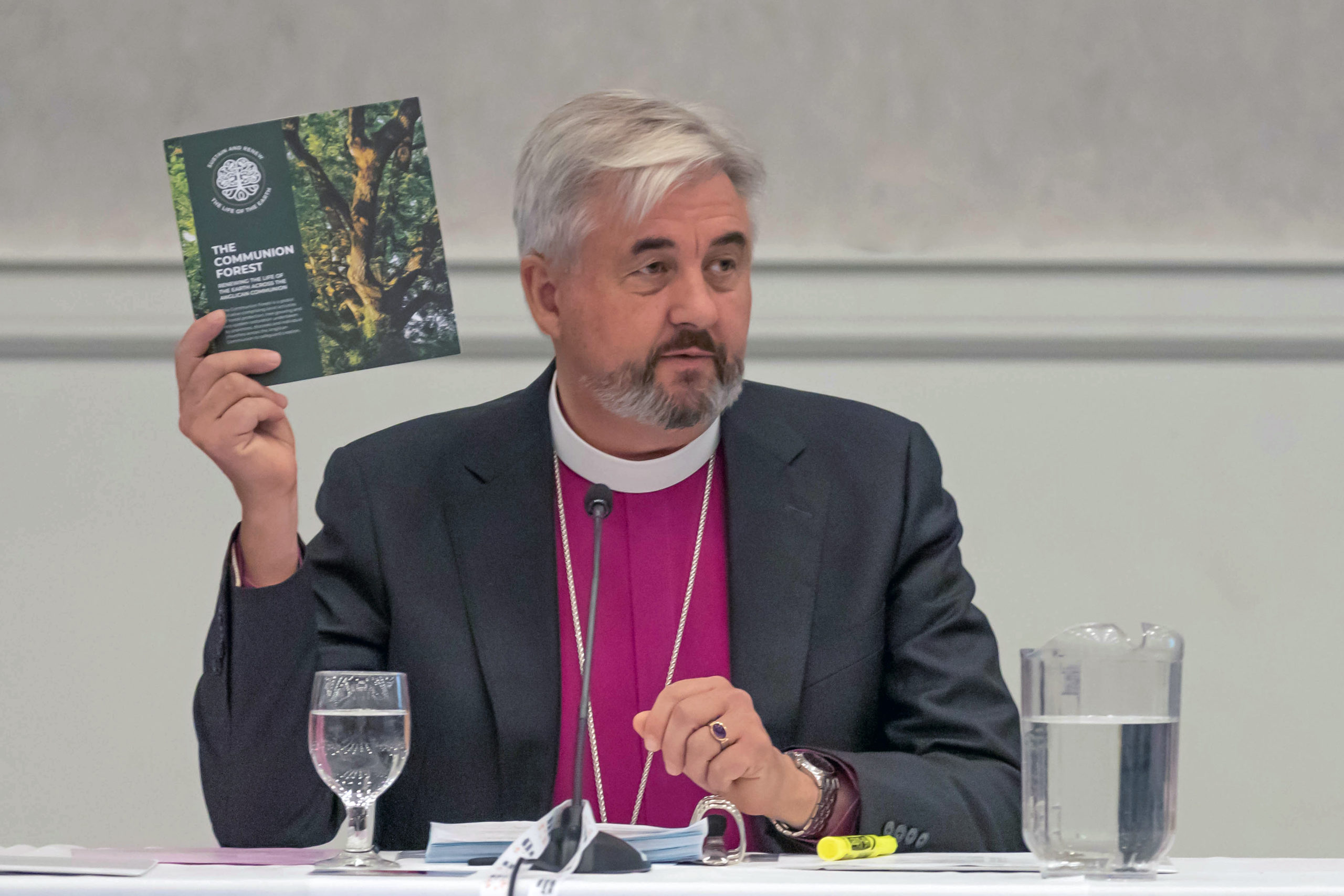At an evening Eucharist service on Oct. 20, Bishop Shane Parker delivered his charge to open the 142nd Synod of the Anglican Diocese of Ottawa. “We are poised to make major decisions that will infuse the life and work of our diocesan church with new purpose and direction,” he said.
He was referring to the fact that a key focus of the Synod was consideration of proposals relating to the shape of parish ministry in the diocese, the result of a two-year consultative process. “We have been attentive to one another and to the Holy Spirit as we drafted three proposals which are action-oriented. These will result in significant steps to strengthen and nurture parish ministry and offer new approaches to engage with the world—in rural areas, villages, towns, and cities,” he said.
The Anglican Church is smaller and has less influence than it had in the past and now wrestles with questions of how to reimagine itself and to connect with people in an increasingly secular and pluralistic society. Urging the church to proactively guide change rather than passively being changed by social factors around it has been an important focus for Bishop Parker since he was elected in 2020. Consultations involving every parish in the diocese re-examining parish ministry resulted in the proposals being considered at this year’s Synod.
“The proposals are saying we are prepared to address urgent questions and to creatively use our collective resources to strengthen and nurture thriving parish ministries. This is worth restating: we are saying we want to consolidate our overall parish ministry structure and the operations which support it in order to have well-resourced churches that can thrive,” the bishop told the crowd assembled in Christ Church Cathedral in Ottawa.
“The proposals are saying we want lay leaders across our diocese to be well-supported and well-equipped to share in robust parish ministries. We want to create new worshipping communities and learn how to share the love of God in an age where many are very wary of religion.
We want to be part of a church that is thriving.”
The bishop thanked all those who worked on the Shape of Parish Ministry Consultations. “I am very grateful for the hours of work represented in the three proposals coming before our Synod.” And he made a commitment to the ambitious plan for work ahead: “I am also conscious of the hours of work we must do as the people, clergy, and bishop of this diocesan church if we adopt them—because they have to be implemented in a timely and disciplined manner. With Ascension House staff and our key lay and clergy leaders, I stand ready to make the implementation of these proposals a top priority over the next 18 months.”
Bishop Parker frequently describes the diocesan church as a body with two arms—parish ministry and community ministry. Diocesan Community Ministries include the Anglican Day Programs (St. Luke’s Table, Centre 454 and The Well), Centre 105 in Cornwall, Ont., Cornerstone Housing for Women, the Ottawa Pastoral Counselling Centre, and the Refugee Ministry. “As our parish ministry arm is being reshaped to thrive, our community ministry arm is likely being called to expand,” he said. “We are very good at providing day programs and affordable housing, and, sadly, there is a growing need for both as socio-economic inequities continue to play out in our communities. I firmly believe that we can build our diocese’s capacity to carefully expand our community ministry to serve those who cry out for justice, compassion, shelter, and dignity.”
The bishop’s charge also emphasized the church’s commitment to social justice, particularly decolonization and reconciliation work with Indigenous peoples and the diocesan Anti-Racism Project.
Bishop Parker made particular mention of two efforts to live up to commitments in the Anglican baptismal covenant “to safeguard the integrity of God’s creation, and respect, sustain, and renew the life of the Earth.” He pointed out that in 2015, Synod was to “direct Diocesan Council to chart a course for the complete decarbonization of all the buildings of the Diocese, that will involve measurable benchmarks and a defined set of actions.” Unfortunately, he said, “we did not act decisively on this motion, and I intend to table it again at Diocesan Council, trusting that the increased urgency of the climate crisis will compel us to address its concerns in an appropriate and effective manner —with the guidance of our new director of property and asset management.”
The second effort is part of a global one. When the bishop travelled to the 2022 Lambeth Conference in July, meeting with bishops from across the international Anglican Communion, an initiative called the Communion Forest was launched. It can include a broad swath of “activities of forest protection, tree-growing and eco-system restoration undertaken by provinces, dioceses and individual churches across the Anglican Communion. The Communion Forest is described as ‘a global act of hope.’ The forestation activities are determined locally so they are ‘geographically, culturally and environmentally appropriate.’ The forest ‘will therefore look very different in different parts of the Communion.’ Local expressions ‘might be about trees but could equally be about grasslands, wetlands or coastal habitats.’” The bishop encouraged everyone in the diocese to embrace the initiative, and he said he would ask Diocesan Council to request that the new Partnerships Committee establish a relationship with the Communion Forest organization.
Having described the challenges ahead, Bishop Parker concluded his charge by encouraging everyone. “This is an exciting time, and we must seize both the moment and the momentum and respond with faithful determination to the important tasks which have fallen to our generation. There is no doubt in my mind that our diocese has the capacity to do this, and, with God’s help, we will.”
To shape our parish ministry, we want well-equipped leaders and new worshipping communities.


St. James, Morrisburg — Stormont Deanery